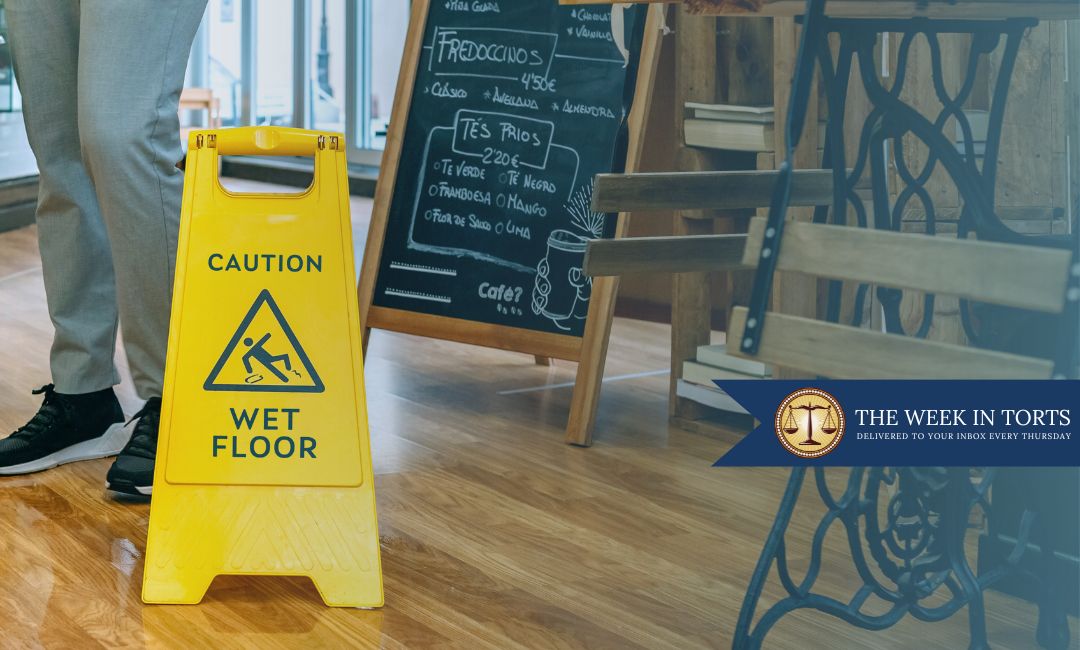The Week In Torts – Cases from November 24, 2023

We’re going to need more than that.
FLORIDA LAW WEEKLY
VOLUME 48, NUMBER 47
CASES FROM THE WEEK OF NOVEMBER 24, 2023
TRIAL COURT PROPERLY DISREGARDED ALLEGED ORAL STATEMENT OF AN ANONYMOUS SERVER AT A RESTAURANT IN A SLIP AND FALL CASE, PROPERLY ENTERING SUMMARY JUDGMENT IN THE FACE OF NO ISSUES OF MATERIAL FACT
Sentz v. Bonefish Grill, 48 Fla. L. Weekly D2197 (Fla. 4th DCA Nov. 15, 2023):
A woman slipped and fell near the ladies’ room at a Bonefish Grill. She testified that she slipped and fell in a liquid about eight to twelve feet from the bathroom door, and the floor was tile that looked like hardwood.
The plaintiff did not see the liquid. She did not know how it got on the floor or how long it had been there. The puddle had a diameter of about twelve to eighteen inches, and she saw melted pieces of ice in the puddle.
The plaintiff testified that before she returned to her table, a server came around the corner, and when the plaintiff told the server about the water spill, the server acknowledged she had been aware of it and had come to clean it up. The plaintiff did not get the server’s name, only describing her as a white female in her early twenties with brownish hair and a ponytail.
Bonefish moved for summary judgment on the issue of notice, claiming that despite intensive canvassing of its employees, it didn’t cover any evidence of actual or constructive notice, and there was no incident report of any fall on the date the plaintiff fell.
The plaintiff responded by arguing that the hearsay statement testified to provided notice of the dangerous condition. She relied upon a case for the proposition that it was not necessary for her to name the employee for the statement to be admissible under the party admission exception to the hearsay rule.
In looking to section 768.0755 regarding slip and falls arising from a transitory foreign substance, an injured person must prove a business establishment had actual or constructive notice of the dangerous condition, and that it should have taken action to remedy it, before pursuing a cause of action.
The only evidence here was of the actual notice and that came from the hearsay statement. The court concluded that the statement was not admissible in accordance with the exception, because the plaintiff did not have enough circumstantial evidence to make the preliminary showing that the anonymous employee’s statement should be admitted against the employer.
While the plaintiff described the server as a white female in her early twenties with dark hair and a ponytail, she did not know the name of the server, nor did she attest to any characteristics such as a uniform or a name tag, or provide any evidence of items that would have identified the person as a server.
The court concluded that the quantum of circumstantial evidence of the server’s identity as a Bonefish employee fell below the threshold set in the cases, and thus the inadmissible hearsay could not be used to defeat the motion for summary judgment.
For comparison, in the cases where the circumstantial evidence was enough, the plaintiff had described the uniforms worn by the employee or had identified the person as wearing a store name tag, or noted that the person was standing in a check-out lane at a grocery store.
TRIAL COURT ERRED IN ENFORCING SETTLEMENT AGREEMENT WITHOUT HOLDING AN EVIDENTIARY HEARING TO SETTLE THE DISPUTE AS TO WHETHER THE SETTLEMENT AGREEMENT HAD ACTUALLY BEEN REACHED
Harripersad v. Lake Park Gardens, 48 Fla. L. Weekly D2198 (Fla. 4th DCA Nov. 15, 2023):
When parties dispute whether a settlement agreement has been reached, they are entitled to an evidentiary hearing. Here, the trial court erred in enforcing a settlement agreement without conducting an evidentiary hearing to determine whether a settlement had actually been reached.
The court also enforced the settlement in the same hearing in which it had allowed her prior attorney to withdraw, leaving her unrepresented and thus rendering her a victim of a denial of due process.
PLAINTIFFS WAIVED ANY CHALLENGE TO THE VERDICT FORM BY FAILING TO OBJECT
Aileen v. Universal Property and Casualty Insurance Co., 48 Fla. L. Weekly D2198 (Fla. 4th DCA Nov. 15, 2023):
After the trial court rejected the plaintiff’s verdict form finding it to be too confusing, the trial court proposed its own verdict form at the charge conference. The plaintiffs at that time did not object, and even suggested minor changes.
After a verdict and judgment in the defendant’s favor, the plaintiffs challenged the verdict form as having been flawed and incomplete.
The court was unpersuaded by the plaintiff’s appeal, finding it unpreserved. By consenting or failing to object, the plaintiffs waived any challenge to the form and could not lay retrospective blame upon the trial judge.

